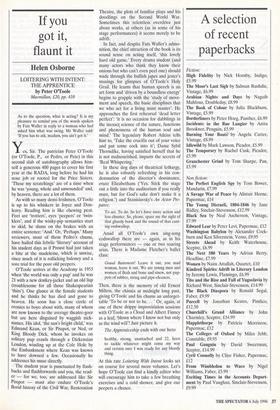If you got it, flaunt it
Helen Osborne
LOITERING WITH INTENT: THE APPRENTICE by Peter O'Toole Macmillan, £20, pp. 410
As to the question, what is acting? It is my pleasure to remind you of the words spoken by Fats Waller in reply to a woman who had asked him what was swing. Mr Waller said: `If you has to ask, madam, you ain't got it.'
Yes, Sir. The patrician Peter O'Toole (or O'Toole, P., or Pedro, or Pete) in this second slab of autobiography allows him- self a generous 400 pages to cover his first year at the RADA, long before he had his nose job or rooted for the Price Sisters. 'These my scratchings' are of a time when he was 'young, whole and unwounded' and, by heaven, there are a lot of them.
As with so many demi-Irishmen, O'Toole is up to his whiskers in Joyce and Don- leavy. Reading him is like chewing peat. Feet are 'trotters', eyes 'peepers' or 'twin- klers', and if the winky-pip semantics start to skid, he slams on the brakes with an entire sentence: 'And.' Or, 'Perhaps.' Many reviewers, most of them Pedro's chums, have hailed this febrile 'literary' account of his student days as if Proust had just taken a bite at the madeleine, which is unwise, since much of it is rollicking baloney and a sore trial for the poor old peepers.
O'Toole arrives at the Academy in 1953 when 'the world was only a pup' and he was 21 with a new donkey-jacket and an old lisp (troublesome for all those Shakespearian `thins'), One glance at the female students and he thinks he has died and gone to heaven. He soon has a close circle of cronies to boyo about with, many of whom are now known to the average theatre-goer but are here disguised by waggish nick- names. His idol, 'the sun's bright child,' was Edmund Kean, or Sir Pisspot, or Ned, or King Bloody Dick, whom, he invokes on solitary pup crawls through a Dickensian London, winding up at the Cole Hole by the Embankment where Kean was known to have downed a few. Occasionally he addresses his muse directly.
The student year is punctuated by flash- backs and flashforwards and you, the read- er — for we, too, are addressed like Sir Pisspot — must also endure O'Toole's florid history of the Civil War, Restoration
Theatre, the plots of familiar plays and his doodlings on the Second World War. Sometimes this relentless overdrive just about works, at others (as in some of his stage performances) it seems merely to be adrift.
In fact, and despite Fats Waller's admo- nition, the chief attraction of the book is its sound sense on acting itself, 'this lovely hard old game.' Every drama student (and many actors who think they know their onions but who can't even peel one) should wade through the bullish japes and jester's musings for glimpses of O'Toole's Holy Grail. He learns that human speech is an art form and 'driven by a boundless energy' begins to grapple with the 'study of move- ment and speech, the basic disciplines that we who act for a living must master'. He approaches the first rehearsal 'dead letter perfect': 'it is no occasion for dabblings in the inexact science of the nature, functions and phenomena of the human soul and mind.' The legendary Robert Atkins tells hini to, 'Take the crucifix out of your voice and put some cock into it'; Dame Sybil Thorndike, having satisfied herself that he is not malnourished, imparts the secrets of 'Real Whispering.'
In these dog days of theatrical lethargy, he is also robustly refreshing in his con- demnation of the director's dominance, ersatz Elizabethans (`Yes. Stick the stage out a little into the auditorium if you really must, but for God's sake don't make it a religion.') and Stanislaysky's An Actor Pre- pares:
To act. To do. So let's have more action and less chunter. So, please, spare me the sight of that ghastly book and the sound of that cant- ing codswallop.
Amid all O'Toole's own sing-song codswallop there are — again, as in his stage performances — one or two soaring arias. There is Madame Fletcher's ballet class:
Grand Battement! Leave it out, you mad woman, leave it out. We are young men and women of flesh and bone and sinew, not pup- pets of rubber, string and pipe-cleaners.
Then, there is the memory of old Ernest Milton, the chints at midnight long past, giving O'Toole and his chums an unforget- table `To be or not to be... ' Or, again, at one of these drippy improvisltion sessions with O'Toole as a Cloud and Albert Finney as a leaf, 'blown where I know not but only as the wind will'! Just picture it.
The Apprenticeship ends with our hero
healthy, strong, unattached and 22, keen to tackle whatever might come my way and certain sure I was ready for any bloody thing.
At this rate Loitering With Intent looks set on course for several more volumes. Let's hope O'Toole can find a kindly editor who will encourage him to take a few breathing exercises and a cold shower, and give our peepers a chance.


























































 Previous page
Previous page